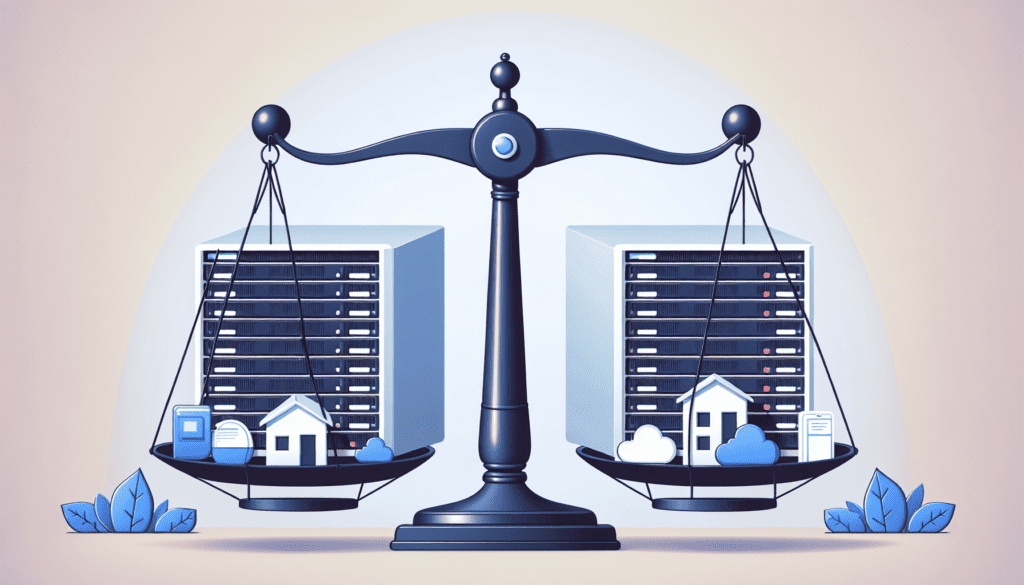“Is Shared Hosting Right For You?”
Shared hosting is a popular option for individuals and small businesses looking to host a website on a budget. Before making a decision, it’s important to weigh the pros and cons of shared hosting to determine if it’s the right choice for you.
“Pros of Shared Hosting”
Shared hosting has several advantages that make it an attractive option for many website owners.
Cost-Effective
One of the main benefits of shared hosting is its affordability. By sharing server resources with other users, the cost of hosting is significantly lower compared to other hosting options. This makes shared hosting ideal for individuals and small businesses with limited budgets.
Easy to Use
Shared hosting is known for its ease of use, making it a great option for beginners. The hosting provider takes care of server maintenance, security updates, and other technical tasks, allowing you to focus on building and managing your website.
“Cons of Shared Hosting”
While shared hosting has its benefits, there are also some drawbacks to consider before making a decision.
Limited Resources
Since you are sharing server resources with other users, there is a risk of resource limitations. If another user on the same server experiences a spike in traffic or consumes a large amount of resources, it can impact the performance of your website. This could result in slower loading times or even downtime for your site.
Lack of Control
With shared hosting, you have limited control over the server settings and configurations. This can be a disadvantage if you require more customization for your website or need specific software installations. Shared hosting may not be the best option for websites with unique requirements.

“Factors to Consider Before Choosing Shared Hosting”
Before signing up for a shared hosting plan, there are several factors to consider to ensure that it meets your needs and requirements.
Traffic Volume
Shared hosting is suitable for websites with moderate traffic levels. If you expect high traffic volumes or large spikes in traffic, shared hosting may not be able to handle the load effectively. Consider your website’s traffic patterns before opting for shared hosting.
Security Measures
Security is a crucial factor to consider when choosing a hosting provider. With shared hosting, there is always a risk of security vulnerabilities due to the shared nature of the server. Make sure the hosting provider offers sufficient security measures, such as regular backups, malware scans, and SSL certificates, to protect your website from potential threats.
Support and Reliability
It’s essential to choose a hosting provider that offers reliable customer support in case you encounter any issues with your website. Look for hosting companies that provide 24/7 support through various channels, such as live chat, phone, and email. Additionally, check the provider’s uptime guarantee to ensure that your website will be accessible to visitors at all times.
Scalability
Consider your future growth plans when choosing a shared hosting plan. Shared hosting may not be suitable if you expect your website to grow significantly in terms of traffic, content, or features. Look for hosting providers that offer easy scalability options, such as the ability to upgrade to a VPS or dedicated server when needed.
“Shared Hosting vs. Other Hosting Options”
Shared hosting is just one of the many hosting options available in the market. Let’s compare shared hosting with other hosting types to help you make an informed decision.
Shared Hosting vs. VPS Hosting
VPS (Virtual Private Server) hosting offers a more robust and flexible hosting solution compared to shared hosting. With VPS hosting, you have dedicated resources and more control over server settings, making it ideal for websites with higher traffic volumes and custom requirements. However, VPS hosting is typically more expensive than shared hosting.
Shared Hosting vs. Dedicated Hosting
Dedicated hosting provides the highest level of performance, security, and customization options, as you have the entire server to yourself. Dedicated hosting is suitable for large websites and online businesses that require maximum resources and control. However, dedicated hosting is the most expensive hosting option and may not be necessary for smaller websites.
Shared Hosting vs. Cloud Hosting
Cloud hosting offers scalability and reliability by hosting your website on a network of virtual servers in the cloud. Cloud hosting is a flexible and cost-effective solution that can handle high traffic volumes and spikes effectively. However, cloud hosting is more complex to manage compared to shared hosting, and it may require some technical expertise.

“Tips for Maximizing Shared Hosting Benefits”
While shared hosting has its limitations, there are ways to optimize its benefits and ensure your website performs well.
Optimize Your Website
Optimizing your website for speed and performance can help mitigate the impact of resource limitations on a shared server. Use a lightweight theme, compress images, and enable caching to reduce loading times and improve user experience.
Monitor Resource Usage
Keep an eye on your website’s resource usage to identify any spikes or inefficiencies. Most hosting providers offer monitoring tools that allow you to track CPU, memory, and disk usage. By monitoring resource usage, you can proactively address any issues that may affect your website’s performance.
Implement Security Measures
Protect your website from security threats by implementing robust security measures. Use strong passwords, install security plugins, and keep your software up to date to prevent vulnerabilities. Regularly scan your website for malware and perform backups to ensure your data is safe.
Communicate with Your Hosting Provider
If you encounter any issues with your shared hosting plan, don’t hesitate to reach out to your hosting provider for assistance. Whether it’s slow loading times, security concerns, or technical difficulties, the support team can help you resolve any issues and ensure your website runs smoothly.
“Conclusion”
In conclusion, shared hosting is a cost-effective and user-friendly hosting option for individuals and small businesses looking to establish an online presence. While shared hosting has its limitations in terms of resources and control, it can be a suitable choice for websites with moderate traffic levels and standard requirements. Before choosing a shared hosting plan, consider your website’s needs, future growth plans, and the level of support and security provided by the hosting provider. By weighing the pros and cons of shared hosting and following the tips for maximizing its benefits, you can make an informed decision and ensure your website performs well on a shared server.











